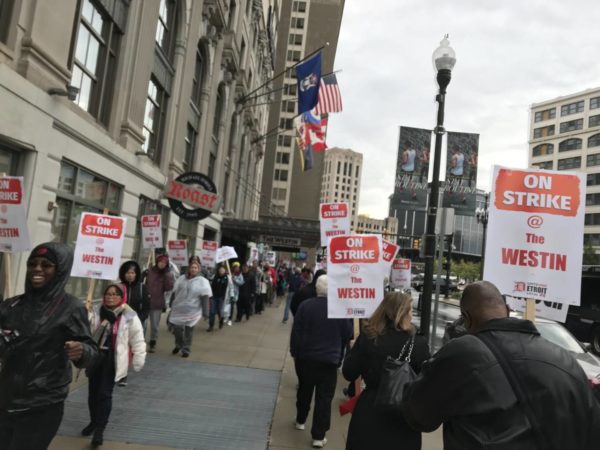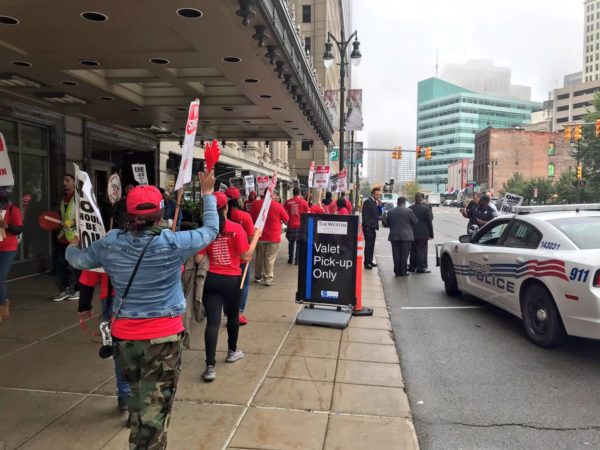DETROIT, Mich.—Workers at Marriott hotels in Detroit and Oakland approved contract deals ending their four-week walkouts over the Nov. 2-4 weekend, but the bulk of the more than 7,000 workers on strike against the chain remain out.

In Oakland, about 200 Local 2 members at the Marriott City Center, out since Oct. 5, ratified an agreement Nov. 2. In Detroit, about 160 Local 24 members on strike against the Westin Book Cadillac approved their contract deal Nov. 3.
The strike continues at 21 other Marriott hotels, in San Francisco, Boston, San Diego, San Jose, and the islands of Oahu and Maui in Hawaii.
UNITE HERE said it would not release details of the Detroit and Oakland settlements until the strikers in other cities have reached agreements, but said they “include historic progress on crucial issues impacting hotel workers, including automation, wages and benefits, and working conditions.”
“We are encouraged by the progress achieved in resolving the strikes in Oakland and Detroit with strong, fair contracts,” International President D. Taylor said in a statement. “The progress made by Marriott this week in both cities shows that they are able to make reasonable movement, and we are hopeful that soon one job will be enough to live with dignity on at every Marriott in all cities.”
“Regardless of background, race, age, or department, workers refused to be divided,” Local 24 President Nia Winston said in a statement to LaborPress. “What we’ve achieved will change workers’ lives — and the hotel industry here in Detroit.” Several conventions scheduled for the hotel cancelled, a Local 24 spokesperson told LaborPress, and singer Elton John, coming to Detroit on his farewell tour, stayed in a different hotel after the union contacted his team.
About 2,700 workers remain on strike in Hawaii, at five hotels owned by Kyo-ya Hotels & Resorts. Almost 2,500 are out at seven hotels in San Francisco, and another 1,500 at seven hotels in Boston. The two other hotels on strike are in San Jose and San Diego. The next contract talks in San Francisco are scheduled for Nov. 12-13.
In Oakland and Detroit, UNITE HERE spokesperson Rachel Gumpert told LaborPress, Marriott “made a lot of progress very quickly and rapidly.” Nationally, she says, the two sides have made progress on the issues of automation and safety from sexual harassment, but are still far apart on wages and benefits.
Hotel workers’ wages vary from city to city, Gumpert says, but the common denominator is that they haven’t kept up with the cost of living since the Great Recession, so many don’t make enough to survive on just one job.
What we’ve achieved will change workers’ lives — and the hotel industry here in Detroit. — Nia Winston, president, UNITE HERE Local 24
In Detroit, she explains, the $15-an-hour median wage for Marriott workers is $2 to $4 less than it is at other union hotels. In Honolulu, experienced housekeepers can make $22 an hour, but it’s common that they still have to work two or three jobs. In San Francisco, the median pay for a housekeeper with 20 years on the job is $44,000 a year, but “the entire Bay Area has gotten so expensive that sometimes they can’t live anywhere within a two-hour commute.”
One reason why UNITE HERE selected Marriott, she adds, is that as the biggest hotel operator in places like San Francisco, it “sets the ceiling” for wages, as smaller chains such as Hilton and Hyatt say they can’t pay more than Marriott does.

“We live in a city where it’s in demand to have two jobs: one just to pay rent and one for survival,” hotel culinary worker Diana Gochez told a special hearing of the San Francisco Board of Supervisors Nov. 2.
Marriott CEO Arne Sorenson rejected an invitation to testify at that hearing. “The union seemed more interested in participating in a long-planned, multicity, 23-hotel strike against Marriott than they were in engaging in any meaningful negotiations,” he told Supervisor Hillary Ronen in an Oct. 31 letter obtained by KQED-FM. He said the strikes were “not the result of a bargaining impasse in any city, but rather, it seems, part of the union’s bargaining strategy from the outset.”
Ronen told KQED she was “insulted” by Sorenson’s refusal to show up.
Another crucial issue, says Gumpert, is Marriott’s “Green Choice” program, in which the company gives guests incentives to forgo housekeeping services during their stay, ostensibly to help “reduce the use of water, energy, and chemicals.”
This, she says, means that workers often have their hours cut below full-time, and that when the guest checks out, the room requires deeper cleaning—but housekeepers still have to finish it within the same 30-minute quota they have for cleaning rooms that receive daily housekeeping. In nonunion hotels, she adds, quotas are typically 15 minutes per room.
UNITE HERE has been trying to ease cleaning quotas “for decades,” Gumpert says, but Marriott hasn’t shown much interest.
If that issue isn’t resolved, she adds, the strike is likely to stretch on—and Marriott is “not in a position to starve us out.”



